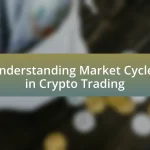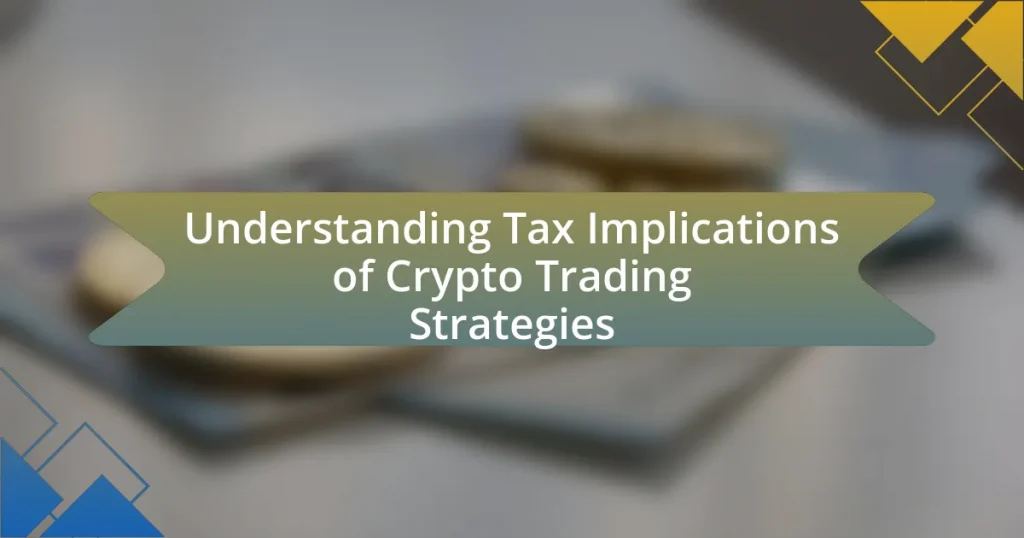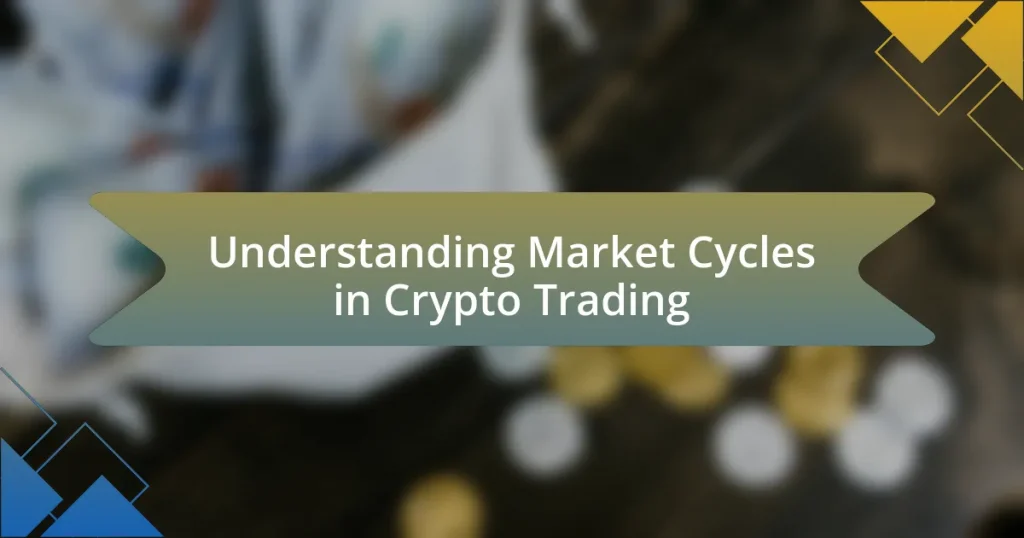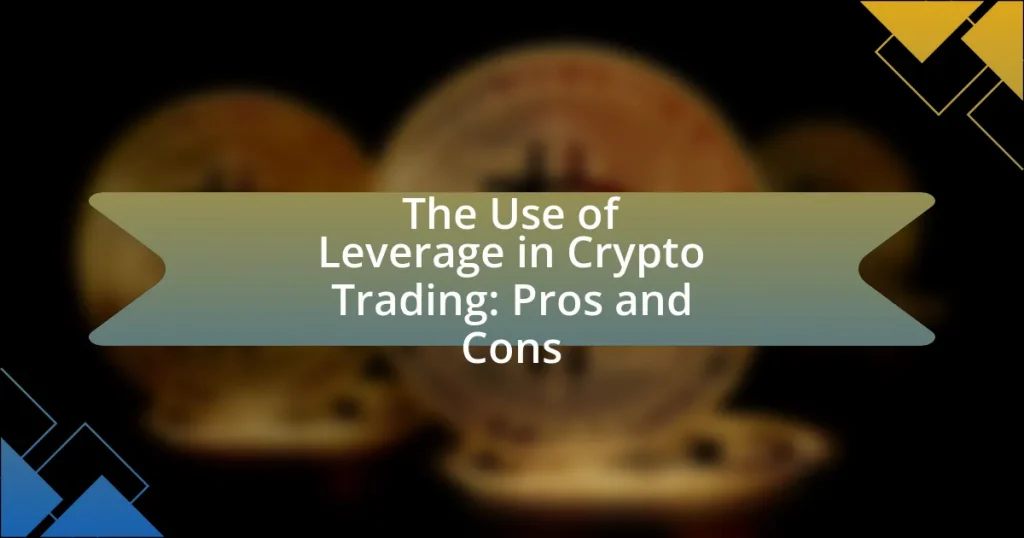Decentralized exchanges (DEXs) are platforms that enable peer-to-peer trading of cryptocurrencies without intermediaries, enhancing user control, security, and privacy. This article explores the significance of DEXs in modern crypto trading, highlighting their advantages over centralized exchanges, such as lower fees, greater accessibility, and improved market liquidity. Key features of DEXs, including their role in price discovery and the challenges they face, such as regulatory issues and security risks, are also examined. Additionally, the article discusses future trends, technological advancements, and best practices for users engaging with DEXs, emphasizing their potential to promote financial inclusion and empower unbanked populations.

What are Decentralized Exchanges and Their Importance in Crypto Trading?
Decentralized exchanges (DEXs) are platforms that facilitate peer-to-peer trading of cryptocurrencies without the need for a central authority or intermediary. DEXs operate on blockchain technology, allowing users to retain control of their funds and trade directly with one another, which enhances security and privacy. The importance of DEXs in crypto trading lies in their ability to provide greater accessibility, as they often do not require extensive identity verification, enabling users from various regions to participate in trading. Additionally, DEXs contribute to market liquidity and reduce the risk of manipulation associated with centralized exchanges, as they operate transparently on public ledgers. According to a report by CoinGecko, DEXs accounted for over 20% of the total trading volume in the cryptocurrency market in 2021, highlighting their growing significance in the ecosystem.
How do Decentralized Exchanges differ from Centralized Exchanges?
Decentralized exchanges (DEXs) differ from centralized exchanges (CEXs) primarily in their operational structure and control over assets. DEXs facilitate peer-to-peer trading without an intermediary, allowing users to retain control of their funds through personal wallets, while CEXs require users to deposit funds into the exchange’s custody, which can lead to security risks such as hacks or insolvency. According to a report by Chainalysis, DEXs have seen significant growth, with trading volumes increasing by over 1,000% from 2020 to 2021, highlighting their rising popularity and trust among users seeking autonomy and privacy in their trading activities.
What are the key features of Decentralized Exchanges?
Decentralized exchanges (DEXs) are platforms that facilitate peer-to-peer trading of cryptocurrencies without the need for a central authority. Key features of DEXs include enhanced privacy, as users retain control of their private keys and personal data; reduced counterparty risk, since trades occur directly between users; and increased security, as funds are not held in a central wallet vulnerable to hacks. Additionally, DEXs often provide greater access to a wider variety of tokens, including those that may not be listed on centralized exchanges, and they typically operate on blockchain technology, ensuring transparency and immutability of transactions. These features collectively contribute to the growing popularity of DEXs in the modern crypto trading landscape.
Why do traders prefer Decentralized Exchanges over Centralized ones?
Traders prefer Decentralized Exchanges (DEXs) over Centralized Exchanges (CEXs) primarily due to enhanced security and control over their assets. DEXs operate on blockchain technology, allowing users to trade directly from their wallets without the need to deposit funds into a centralized platform, which reduces the risk of hacks and thefts that have plagued CEXs. For instance, in 2021, centralized exchanges experienced significant security breaches, leading to the loss of millions in user funds, while DEXs, by design, minimize such vulnerabilities. Additionally, DEXs offer greater privacy and anonymity, as they typically do not require extensive personal information for trading, aligning with the ethos of decentralization in the cryptocurrency space.
What role do Decentralized Exchanges play in the overall crypto ecosystem?
Decentralized exchanges (DEXs) facilitate peer-to-peer trading of cryptocurrencies without the need for intermediaries, thereby enhancing user control and privacy. DEXs contribute to the overall crypto ecosystem by providing liquidity, enabling users to trade directly from their wallets, and reducing the risk of hacks associated with centralized exchanges. According to a report by CoinGecko, DEXs accounted for over 20% of total trading volume in the crypto market as of 2023, highlighting their growing significance. Additionally, DEXs support a wide range of tokens and often feature innovative trading mechanisms, such as automated market makers (AMMs), which further diversify trading options for users.
How do Decentralized Exchanges contribute to market liquidity?
Decentralized exchanges (DEXs) contribute to market liquidity by enabling peer-to-peer trading without intermediaries, which increases the number of participants in the market. This increased participation leads to a higher volume of trades, facilitating quicker transactions and tighter bid-ask spreads. For instance, according to a report by Dune Analytics, DEXs accounted for over 20% of total trading volume in the cryptocurrency market in 2021, demonstrating their significant role in enhancing liquidity. Additionally, DEXs utilize automated market makers (AMMs) that allow users to provide liquidity by depositing assets into liquidity pools, further increasing the available liquidity for trading pairs.
What impact do Decentralized Exchanges have on price discovery?
Decentralized exchanges (DEXs) significantly enhance price discovery by facilitating direct peer-to-peer trading without intermediaries. This structure allows for a more transparent and efficient market, as prices are determined by real-time supply and demand dynamics. According to a study by the Cambridge Centre for Alternative Finance, DEXs have increased market participation, leading to a broader range of price points and reducing the influence of centralized entities on pricing. Furthermore, the absence of order book manipulation, which is prevalent in centralized exchanges, contributes to more accurate price signals. This decentralized nature fosters a competitive environment that reflects true market sentiment, thereby improving the overall efficiency of price discovery in the cryptocurrency market.
What challenges do Decentralized Exchanges face in modern trading?
Decentralized Exchanges (DEXs) face several significant challenges in modern trading, including liquidity issues, regulatory uncertainty, and security vulnerabilities. Liquidity is a critical concern, as many DEXs struggle to attract sufficient trading volume, which can lead to slippage and less favorable prices for users. According to a report by CoinGecko, the average liquidity on DEXs is significantly lower than that of centralized exchanges, making it difficult for traders to execute large orders without impacting market prices.
Regulatory uncertainty poses another challenge, as governments worldwide are still developing frameworks to govern cryptocurrency trading. This lack of clarity can deter users from engaging with DEXs, fearing potential legal repercussions. For instance, the Financial Action Task Force (FATF) has issued guidelines that could impose stringent compliance requirements on DEXs, complicating their operations.
Security vulnerabilities also remain a pressing issue, as DEXs are often targeted by hackers due to their decentralized nature and reliance on smart contracts. A report from CipherTrace indicated that over $1.9 billion was lost to DeFi hacks in 2021, highlighting the risks associated with using DEXs. These challenges collectively hinder the growth and adoption of decentralized exchanges in the competitive landscape of modern crypto trading.
What security risks are associated with Decentralized Exchanges?
Decentralized exchanges (DEXs) face several security risks, including smart contract vulnerabilities, lack of regulatory oversight, and susceptibility to phishing attacks. Smart contract vulnerabilities can lead to exploits, as evidenced by incidents like the $31 million hack of the DAO in 2016, which highlighted the risks inherent in poorly coded contracts. The absence of regulatory oversight means that users have limited recourse in the event of fraud or loss, increasing the risk of scams. Additionally, phishing attacks targeting users can compromise private keys, leading to significant financial losses. These factors collectively contribute to the security challenges associated with DEXs in the crypto trading landscape.
How do regulatory issues affect Decentralized Exchanges?
Regulatory issues significantly impact Decentralized Exchanges (DEXs) by influencing their operational frameworks and user accessibility. For instance, regulations can impose compliance requirements that DEXs may struggle to meet due to their inherently decentralized nature, which often lacks a central authority to enforce such compliance. A notable example is the Financial Action Task Force (FATF) guidelines, which recommend that exchanges implement Know Your Customer (KYC) protocols; however, many DEXs do not have the infrastructure to enforce these measures, potentially leading to legal challenges or restrictions in certain jurisdictions. Additionally, regulatory scrutiny can deter users from engaging with DEXs, as concerns about legality and security arise, impacting trading volumes and liquidity.
How can users effectively utilize Decentralized Exchanges?
Users can effectively utilize Decentralized Exchanges (DEXs) by understanding their operational mechanics and leveraging their unique features. DEXs allow users to trade cryptocurrencies directly from their wallets without the need for intermediaries, enhancing security and privacy. Users should familiarize themselves with the specific DEX interface, including how to connect their wallets, select trading pairs, and execute trades.
Additionally, users can benefit from utilizing liquidity pools and yield farming opportunities available on many DEXs, which can provide passive income through token rewards. According to a report by Dune Analytics, the total value locked in DEXs reached over $100 billion in 2021, indicating significant user engagement and potential for profit.
Moreover, users should remain aware of the risks associated with DEXs, such as smart contract vulnerabilities and market volatility, to make informed trading decisions. By actively engaging with the DEX community and utilizing available resources, users can enhance their trading strategies and overall experience in the decentralized finance ecosystem.
What strategies can traders employ on Decentralized Exchanges?
Traders can employ several strategies on Decentralized Exchanges (DEXs), including liquidity provision, arbitrage, and yield farming. Liquidity provision involves supplying assets to liquidity pools, allowing traders to earn fees from transactions. For instance, Uniswap allows users to earn a share of the trading fees proportional to their contribution to the pool. Arbitrage takes advantage of price discrepancies between different DEXs or between DEXs and centralized exchanges, enabling traders to buy low on one platform and sell high on another. Yield farming involves staking or lending assets in return for interest or additional tokens, often incentivized by the DEX itself. These strategies leverage the unique features of DEXs, such as lower fees and greater access to a variety of tokens, enhancing trading opportunities.
What are the best practices for ensuring security while trading on Decentralized Exchanges?
To ensure security while trading on Decentralized Exchanges (DEXs), users should implement several best practices. First, utilizing a hardware wallet for storing cryptocurrencies significantly reduces the risk of hacks, as these wallets keep private keys offline. According to a report by the Blockchain Security Company, hardware wallets are considered one of the safest options for crypto storage, as they are less susceptible to malware attacks.
Second, enabling two-factor authentication (2FA) adds an extra layer of security to accounts, making unauthorized access more difficult. A study by Cybersecurity Ventures indicates that 2FA can prevent up to 99.9% of automated attacks.
Third, users should conduct thorough research on the DEX being used, including its security protocols and history of breaches. Data from the DeFi Safety Index shows that platforms with transparent security audits and a strong community reputation are generally safer.
Fourth, avoiding public Wi-Fi networks when trading helps prevent potential interception of sensitive information. The Federal Trade Commission warns that public networks can expose users to various cyber threats.
Lastly, keeping software and devices updated ensures that users benefit from the latest security patches, reducing vulnerabilities. The National Institute of Standards and Technology emphasizes that regular updates are crucial for maintaining cybersecurity.
By following these practices, traders can significantly enhance their security while engaging in transactions on Decentralized Exchanges.

What are the Advantages of Using Decentralized Exchanges?
Decentralized exchanges (DEXs) offer several advantages, including enhanced security, greater privacy, and reduced reliance on intermediaries. Security is improved because users retain control of their private keys, minimizing the risk of hacks that often target centralized exchanges. Greater privacy is achieved as DEXs typically require less personal information, allowing users to trade without extensive identity verification. Additionally, reduced reliance on intermediaries means that trades can occur directly between users, often resulting in lower fees and faster transaction times. According to a report by Chainalysis, DEXs have seen a significant increase in trading volume, indicating their growing acceptance and trust within the crypto community.
How do Decentralized Exchanges enhance user privacy?
Decentralized exchanges enhance user privacy by allowing transactions to occur directly between users without the need for an intermediary. This peer-to-peer model minimizes the collection of personal data, as users can trade cryptocurrencies using pseudonymous addresses rather than revealing their identities. Furthermore, decentralized exchanges often operate on blockchain technology, which provides transparency while maintaining user anonymity, as transaction details are recorded on a public ledger without linking them to personal information. This structure significantly reduces the risk of data breaches and unauthorized access to user information, as seen in traditional centralized exchanges where user data is stored in centralized databases.
What measures do Decentralized Exchanges take to protect user data?
Decentralized exchanges (DEXs) implement several measures to protect user data, primarily through the use of blockchain technology and cryptographic protocols. DEXs do not require users to create accounts or provide personal information, which minimizes the risk of data breaches. Additionally, they utilize smart contracts to facilitate trades directly between users, ensuring that transaction details remain private and secure. The decentralized nature of these platforms also means that there is no central point of failure, further enhancing data security. Furthermore, many DEXs employ advanced encryption techniques to safeguard user transactions and wallet information, making it difficult for unauthorized parties to access sensitive data.
Why is anonymity important for crypto traders?
Anonymity is important for crypto traders because it protects their financial privacy and reduces the risk of targeted attacks. By maintaining anonymity, traders can engage in transactions without exposing their identities, which helps prevent hacking, fraud, and unwanted scrutiny from authorities. Additionally, anonymity allows traders to operate in a decentralized environment where they can avoid censorship and maintain control over their assets. This is particularly relevant in the context of decentralized exchanges, where user identities are not tied to transactions, reinforcing the principle of privacy that many cryptocurrencies aim to uphold.
What cost benefits do Decentralized Exchanges offer?
Decentralized exchanges (DEXs) offer significant cost benefits primarily through lower trading fees compared to centralized exchanges. DEXs typically charge minimal transaction fees, often ranging from 0.1% to 0.3%, while centralized exchanges can impose fees as high as 1% or more. Additionally, DEXs eliminate the need for intermediaries, reducing costs associated with custody and management of funds. This model allows users to retain full control over their assets, avoiding withdrawal fees that centralized platforms often charge. Furthermore, DEXs operate on blockchain technology, which can lead to reduced operational costs due to automation and efficiency in trade execution.
How do trading fees on Decentralized Exchanges compare to Centralized Exchanges?
Trading fees on Decentralized Exchanges (DEXs) are generally lower than those on Centralized Exchanges (CEXs). DEXs typically charge fees ranging from 0.1% to 0.3% per trade, while CEXs often impose fees between 0.1% and 0.5%, depending on the trading volume and the specific platform. Additionally, DEXs do not require users to deposit funds, which eliminates withdrawal fees associated with CEXs. This fee structure is influenced by the lack of intermediaries in DEXs, which reduces operational costs.
What are the implications of lower fees for traders?
Lower fees for traders significantly enhance their profitability and trading volume. When transaction costs decrease, traders can execute more trades without the burden of high fees, leading to increased market participation. For instance, a study by the Cambridge Centre for Alternative Finance found that lower fees on decentralized exchanges can lead to a 20% increase in trading activity, as traders are more inclined to capitalize on market opportunities without worrying about excessive costs. This increased activity can also contribute to improved liquidity in the market, benefiting all participants.
How do Decentralized Exchanges promote financial inclusion?
Decentralized exchanges (DEXs) promote financial inclusion by enabling individuals to trade cryptocurrencies without the need for intermediaries, thereby reducing barriers to entry. DEXs operate on blockchain technology, allowing users to maintain control over their funds and conduct transactions directly with one another. This model eliminates the need for traditional banking services, which often exclude unbanked populations. According to a report by the World Bank, approximately 1.7 billion adults remain unbanked, highlighting the potential for DEXs to provide access to financial services for these individuals. Furthermore, DEXs often require minimal identification, allowing users from regions with strict financial regulations to participate in global markets.
What opportunities do Decentralized Exchanges provide for unbanked populations?
Decentralized exchanges (DEXs) provide unbanked populations with access to financial services without the need for traditional banking infrastructure. By enabling peer-to-peer trading of cryptocurrencies, DEXs allow individuals to participate in the global economy, facilitating transactions and investments that would otherwise be inaccessible. According to a report by the World Bank, approximately 1.7 billion adults remain unbanked, highlighting the need for alternative financial solutions. DEXs empower these individuals by offering a platform where they can trade assets directly, maintain control over their funds, and engage in decentralized finance (DeFi) applications, thus promoting financial inclusion and economic empowerment.
How can Decentralized Exchanges empower users in developing regions?
Decentralized exchanges empower users in developing regions by providing access to financial services without the need for traditional banking infrastructure. These platforms enable individuals to trade cryptocurrencies directly with one another, bypassing intermediaries and reducing transaction costs. For instance, according to a report by Chainalysis, decentralized finance (DeFi) platforms have seen significant growth in regions like Africa, where traditional banking services are limited. This access allows users to participate in global markets, enhance financial inclusion, and retain control over their assets, which is crucial in areas facing economic instability.

What Future Trends Can We Expect for Decentralized Exchanges?
Future trends for decentralized exchanges (DEXs) include increased integration with traditional finance, enhanced user experience through improved interfaces, and the rise of automated market makers (AMMs). As DEXs evolve, they are likely to incorporate features that facilitate seamless interactions with fiat currencies, making them more accessible to mainstream users. Improved user interfaces will simplify trading processes, attracting a broader audience. Furthermore, AMMs are expected to dominate liquidity provision, allowing users to trade without relying on order books, which can lead to more efficient price discovery. These trends are supported by the growing adoption of blockchain technology and the increasing demand for decentralized financial solutions, as evidenced by the significant rise in DEX trading volumes, which surpassed $200 billion in 2021, according to data from Dune Analytics.
How is technology evolving to improve Decentralized Exchanges?
Technology is evolving to improve Decentralized Exchanges (DEXs) through advancements in blockchain scalability, interoperability, and user experience. Enhanced blockchain scalability solutions, such as Layer 2 protocols like Optimistic Rollups and zk-Rollups, enable faster transaction processing and lower fees, addressing the congestion issues faced by many DEXs. Interoperability improvements, facilitated by cross-chain protocols like Polkadot and Cosmos, allow DEXs to operate across multiple blockchains, increasing liquidity and user access. Additionally, user experience enhancements, including more intuitive interfaces and automated market-making algorithms, streamline trading processes, making DEXs more accessible to a broader audience. These technological advancements collectively contribute to the growing efficiency and adoption of decentralized trading platforms.
What role will smart contracts play in the future of Decentralized Exchanges?
Smart contracts will be fundamental in automating and securing transactions on Decentralized Exchanges (DEXs) in the future. They will facilitate trustless trading by executing trades automatically when predefined conditions are met, eliminating the need for intermediaries. This automation enhances efficiency and reduces transaction costs, as evidenced by the Ethereum blockchain, which has successfully utilized smart contracts to power numerous DEXs like Uniswap and SushiSwap. Furthermore, smart contracts will enable complex trading strategies and liquidity provision mechanisms, allowing users to engage in more sophisticated trading activities while maintaining control over their assets.
How might Layer 2 solutions enhance Decentralized Exchanges?
Layer 2 solutions enhance Decentralized Exchanges (DEXs) by significantly increasing transaction speed and reducing costs. These solutions, such as state channels and rollups, allow for off-chain processing of transactions, which alleviates congestion on the main blockchain. For instance, Ethereum’s Layer 2 solutions can handle thousands of transactions per second compared to the main chain’s limitations, which often struggle with high demand. This scalability leads to lower fees for users, making trading on DEXs more accessible and efficient. Additionally, by improving user experience through faster confirmations, Layer 2 solutions can attract more traders to DEXs, thereby increasing liquidity and overall market activity.
What regulatory changes could impact Decentralized Exchanges?
Regulatory changes that could impact Decentralized Exchanges (DEXs) include the implementation of stricter Know Your Customer (KYC) and Anti-Money Laundering (AML) requirements. These regulations aim to enhance transparency and reduce illicit activities in the cryptocurrency space. For instance, the Financial Action Task Force (FATF) has recommended that countries enforce regulations requiring DEXs to collect user information, similar to traditional financial institutions. Additionally, the European Union’s Markets in Crypto-Assets (MiCA) regulation proposes a framework that could impose licensing requirements on DEXs, potentially limiting their operational flexibility. Such regulatory measures could lead to increased compliance costs and operational changes for DEXs, affecting their user base and market dynamics.
How are governments approaching the regulation of Decentralized Exchanges?
Governments are increasingly focusing on regulatory frameworks for Decentralized Exchanges (DEXs) to address concerns related to consumer protection, anti-money laundering (AML), and taxation. For instance, the European Union has proposed the Markets in Crypto-Assets (MiCA) regulation, which aims to create a comprehensive regulatory framework for crypto assets, including DEXs, to enhance transparency and security in the market. Similarly, the U.S. Securities and Exchange Commission (SEC) has indicated that many tokens traded on DEXs may qualify as securities, thus subjecting them to existing securities laws. These regulatory approaches reflect a growing recognition of the need to balance innovation in the crypto space with the protection of investors and the integrity of financial systems.
What potential outcomes could arise from increased regulation?
Increased regulation of decentralized exchanges could lead to enhanced consumer protection and reduced fraud. By implementing stricter compliance measures, regulatory bodies can ensure that exchanges adhere to standards that safeguard users’ funds and personal information. For instance, the Financial Action Task Force (FATF) has recommended that countries enforce regulations to combat money laundering and terrorist financing in cryptocurrency transactions, which can help legitimize the market and build trust among users. Additionally, increased regulation may result in a more stable market environment, as it can deter malicious actors and promote fair trading practices. However, it could also stifle innovation and limit the operational flexibility of decentralized exchanges, as they may face challenges in meeting regulatory requirements without compromising their core principles of decentralization and user autonomy.
What are the best practices for engaging with Decentralized Exchanges?
The best practices for engaging with Decentralized Exchanges (DEXs) include conducting thorough research, ensuring wallet security, and understanding liquidity pools. Users should research the DEX’s reputation, user reviews, and transaction fees to make informed decisions. Security is paramount; utilizing hardware wallets and enabling two-factor authentication can protect assets from hacks. Additionally, understanding how liquidity pools function helps users make better trading decisions, as liquidity impacts price slippage and trade execution. These practices enhance user experience and mitigate risks associated with trading on DEXs.
How can traders stay informed about developments in Decentralized Exchanges?
Traders can stay informed about developments in Decentralized Exchanges by following industry news platforms, participating in community forums, and subscribing to relevant newsletters. Industry news platforms like CoinDesk and The Block provide timely updates on market trends and regulatory changes affecting decentralized exchanges. Community forums such as Reddit and Discord allow traders to engage with other users, share insights, and discuss recent developments. Additionally, newsletters from blockchain projects and analytics firms often highlight significant updates and innovations in the decentralized exchange space, ensuring traders receive curated information directly to their inbox.
What resources are available for learning about Decentralized Exchanges?
Comprehensive resources for learning about Decentralized Exchanges (DEXs) include online courses, academic papers, and dedicated websites. Platforms like Coursera and Udemy offer courses specifically focused on blockchain technology and DEXs, providing structured learning paths. Academic papers, such as “Decentralized Exchanges: A Comprehensive Survey” by authors from various universities, provide in-depth analysis and insights into the mechanics and implications of DEXs. Additionally, websites like CoinGecko and Decrypt offer articles and guides that cover the latest trends, technologies, and operational frameworks of decentralized trading platforms. These resources collectively enhance understanding of DEXs and their significance in modern crypto trading.














